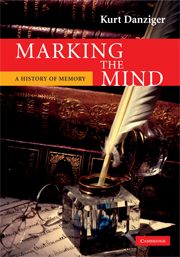6 - Memory kinds
Published online by Cambridge University Press: 05 June 2012
Summary
A coat of many colours
The language of everyday life has many ways of referring to the activity of memory. Not only do we speak of remembering an appointment, we also recollect what was said at yesterday's meeting, reminisce about that vacation in the Alps, recognize the face of a friend not seen for many months, memorize the text of a favourite poem, are reminded of a scene in a film and so on. Moreover, each of these memory words can be used in several different senses, as a glance at any good dictionary will show.
What this seems to tell us about ‘memory’ is that it is essentially an abstraction, a convenient but rather loose way of referring to a large array of activities that are all felt to have something in common. What that something might be is not so easily said. Is it that they all refer to the past? Aristotle thought so. But what about remembering tomorrow's appointment? I may have forgotten making the appointment, but still remember that tomorrow there is this appointment. Philosophers have not found it easy to pinpoint the essence of memory – St Augustine frankly threw up his hands and proclaimed it a mystery.
Attempts at solving the mystery have generally followed one of two paths. One path is that of scepticism: if we cannot pin down the essence of memory, no matter how hard we look, this probably means that there is no such essence, that ‘memory’ and its associated words are just that, words.
- Type
- Chapter
- Information
- Marking the MindA History of Memory, pp. 156 - 187Publisher: Cambridge University PressPrint publication year: 2008



